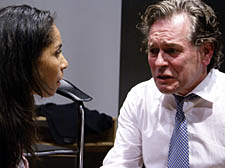|
|
 |
| |
Freudian slips too obvious in frustrating psychodrama
PRIVATE THOUGHTS
Hackney Empire
ERIC is a hard working, morally upstanding, eminently decent man. He has placed himself in a private psychiatric clinic because he believes he is a threat to others. He has been having sexual fantasies about children, he tells his therapist, Dr Chase.
Eric doesn’t want to go into details, but Dr Chase insists he can only cure himself by telling all.
Unfortunately, that is pretty well all there is to this play.
Chase keeps pressing her patient to open up, but Eric remains closed. The two engage in a psychological tug of war until Eric grabs hold of Chase, pleading with her not to leave him, collapsing in a fit of expletive filled rage.
Apparently Eric’s perversions are rooted in his childhood loneliness and associated resentment of his mother and sister – but this is not really explained, and the lack of resolution is frustrating.
There are good things about Private Thoughts. Actors Kevin McGowan and Clara Onyemere are convincing, hitting the right notes with the deadly seriousness that is a requisite for such roles.
Their tug of war manages to be gripping despite its repetitiveness, while Eric’s discomfort and the taboo nature of his fantasies are enough to cause many in the audience to shift awkwardly or stare with embarrassment at the floor.
The subject matter is undoubtedly brave. In red-top tabloids, paedophilia, like much else, is couched in cosmic terms with talk of “evil” and “paedo monsters”. But the reality is more prosaic and unremarkable, and playwright Alex Martinez should be applauded for saying so.
But after tolerating Eric’s psyche and Chase’s therapeutic techniques at centre stage for over an hour, the least one can expect is a decent psychological explanation of why Eric is the way he is. The failure to provide one seems less the result of a conscious desire for ambiguity than of an imbalance in the overall focus of the play.
The lesson, perhaps, is that while Freudian ideas have long inspired great dramas, paintings and novels, they are best used in an auxiliary rather than a front-line role.
Here, they are too “in your face” – the psyche is the story, rather than a part of it.
Until April 25
020 8985 2424 |

|
 |
|
|
 |
|



